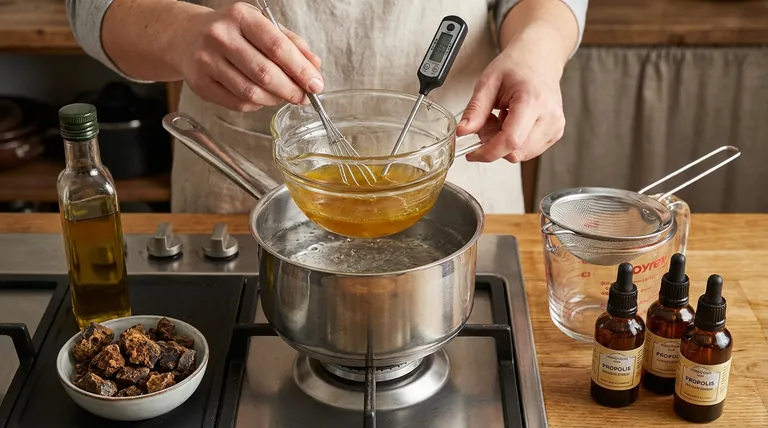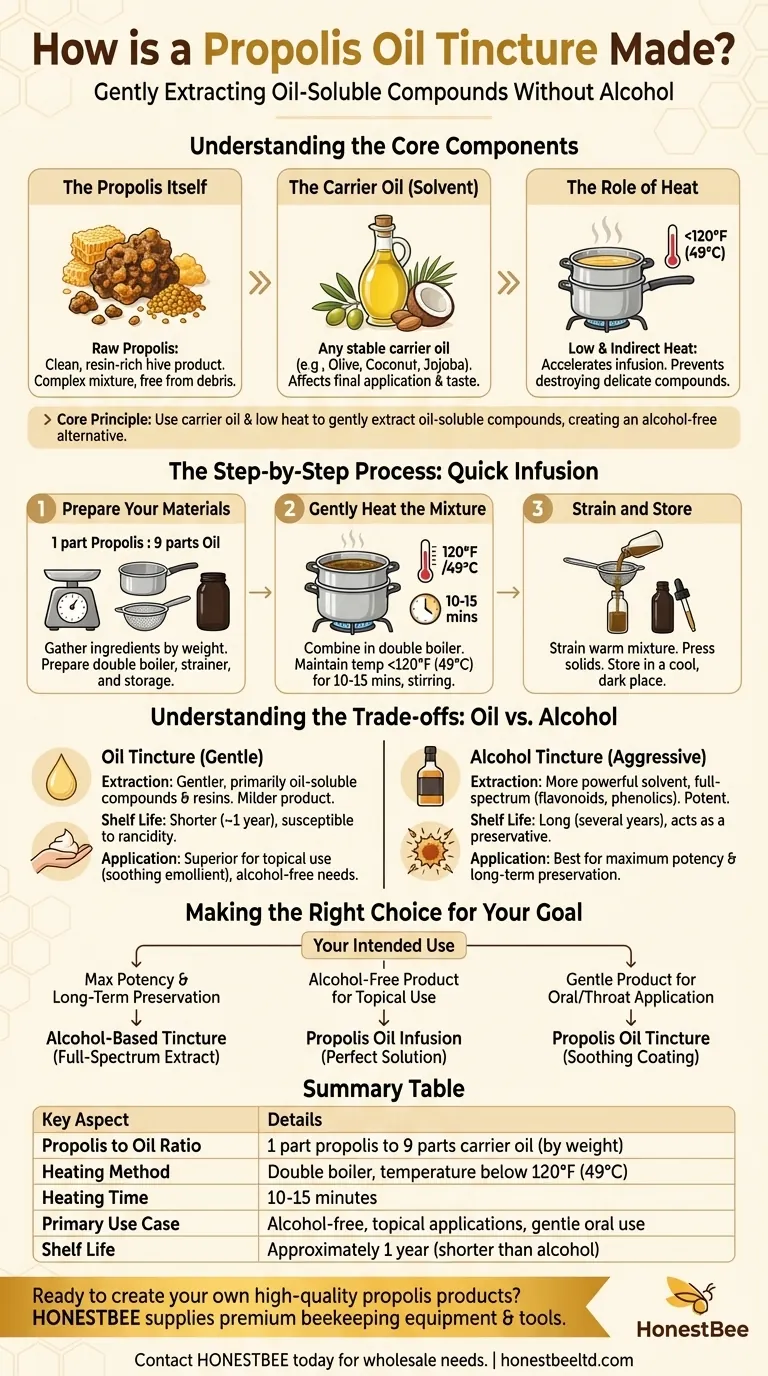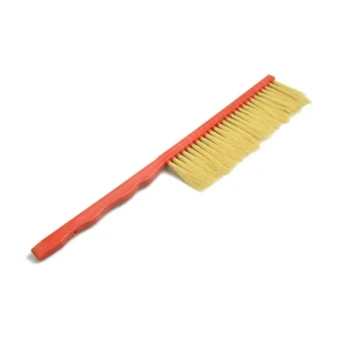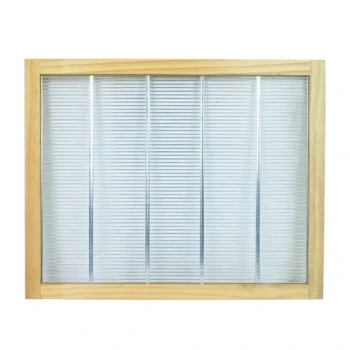To create a propolis oil tincture, you must gently heat a mixture of raw propolis and a carrier oil, such as olive oil. The standard method involves combining one part propolis with nine parts oil in a double boiler, keeping the temperature below 120°F (49°C) for approximately 10 minutes. The resulting infusion is then strained to remove solid particles and stored in a dark glass container to protect it from light degradation.
The core principle of making a propolis oil tincture is not just following a recipe, but understanding that you are using a carrier oil and low heat to gently extract the oil-soluble compounds from raw propolis, creating an effective, alcohol-free alternative to traditional tinctures.

Understanding the Core Components
Before beginning, it's essential to understand the role of each component. This isn't just mixing ingredients; it's a careful extraction process where your choices directly impact the final product's quality and characteristics.
The Propolis Itself
Raw propolis collected from a beehive is a complex mixture of plant resins, beeswax, pollen, and other organic compounds. For any tincture, it's crucial to start with propolis that is as clean as possible, free from debris like wood splinters, paint chips, or insect parts.
The Carrier Oil
The choice of oil serves as your solvent. While the references mention olive oil, any stable carrier oil can work. Olive oil is a common choice for its own health benefits and pleasant taste. Coconut oil is excellent for topical applications that solidify at room temperature, while jojoba or almond oil can be used for skin-care-focused preparations.
The Role of Heat
Heat accelerates the infusion process, encouraging the resins and beneficial compounds in the propolis to dissolve into the oil. However, low and indirect heat is non-negotiable. High temperatures can destroy the volatile compounds and delicate enzymes that make propolis valuable. Using a double boiler prevents scorching and ensures a gentle, even heat.
The Step-by-Step Process: Quick Infusion
This method is fast, efficient, and ideal for producing a quality oil tincture without a long waiting period.
Step 1: Prepare Your Materials
Gather your ingredients: one part raw propolis and nine parts carrier oil by weight. For example, use 10 grams of propolis for every 90 grams of oil. You will also need a double boiler, a fine-mesh strainer (like a coffee filter or clean cheesecloth), and a dark glass jar or dropper bottle for storage.
Step 2: Gently Heat the Mixture
Combine the propolis and oil in the top of your double boiler. Gently heat the water in the bottom pot, ensuring the temperature of the oil mixture does not exceed 120°F (49°C). A digital thermometer is highly recommended for accuracy. Hold this temperature for 10-15 minutes, stirring occasionally.
Step 3: Strain and Store
After heating, carefully strain the warm mixture through your filter into the final storage container. This step separates the infused oil from the insoluble wax and other remaining solids. Press the solids gently to extract as much of the valuable oil as possible. Seal the container and store it in a cool, dark place.
Understanding the Trade-offs: Oil vs. Alcohol
Choosing to make an oil-based tincture is a deliberate decision with specific consequences compared to a more traditional alcohol-based extraction.
Potency and Extraction
Alcohol is a more aggressive and powerful solvent than oil. An alcohol tincture will extract a broader spectrum of compounds, particularly the highly valued flavonoids and phenolic acids. An oil extraction is gentler and will primarily pull out the oil-soluble compounds and some resins, resulting in a different, and often milder, final product.
Shelf Life and Stability
This is a critical trade-off. Alcohol is a preservative, giving alcohol-based tinctures a shelf life of several years. Oil-based tinctures are susceptible to going rancid over time and typically have a much shorter shelf life, often around one year if stored properly.
Application and Use
Oil tinctures are the superior choice for topical applications, as the oil itself acts as a soothing emollient. They are also the only option for individuals who must avoid alcohol for personal, health, or religious reasons.
Making the Right Choice for Your Goal
Your intended use should dictate the method you choose.
- If your primary focus is maximum potency and long-term preservation: A traditional alcohol-based tincture is the superior choice for a full-spectrum extract.
- If your primary focus is an alcohol-free product for topical use or for those avoiding alcohol: The propolis oil infusion method is the perfect solution.
- If your primary focus is a gentle product for direct oral or throat application: An oil tincture provides a soothing coating that an alcohol tincture cannot.
By understanding these principles, you can confidently create a propolis product precisely tailored to your needs.
Summary Table:
| Key Aspect | Details |
|---|---|
| Propolis to Oil Ratio | 1 part propolis to 9 parts carrier oil (by weight) |
| Heating Method | Double boiler, temperature below 120°F (49°C) |
| Heating Time | 10-15 minutes |
| Primary Use Case | Alcohol-free, topical applications, gentle oral use |
| Shelf Life | Approximately 1 year (shorter than alcohol tinctures) |
Ready to create your own high-quality propolis products?
For commercial apiaries and beekeeping equipment distributors, having a reliable source of premium supplies is key to success. HONESTBEE supplies beekeepers and distributors with the essential tools and equipment needed for every aspect of beekeeping, from hive management to product creation.
Contact HONESTBEE today to discuss your wholesale needs and discover how our products can support your operations and help you deliver the best results.
Visual Guide

Related Products
- 8-Frame Electric Self-Reversing Honey Extractor Spinner for Commercial Honey Extraction Equipment
- HONESTBEE 3-Frame Manual Acrylic Honey Extractor
- HONESTBEE 6 Frame Three Use Electric Honey Extractor for Beekeeping
- 24 Frame Honey Extractor Commercial Radial Honey Frame Extraction Machine
- High Performance Plastic Queen Excluder for Beekeeping and Apiary Management
People Also Ask
- In what forms can propolis be purchased? Explore Topical and Oral Options for Optimal Use
- How does a Plastic Propolis Screen induce resin deposition? Master Bee Biology for Higher Yields
- How do honey bees use propolis to handle dead animals? Ingenious Hive Sanitation Revealed
- Why are Commercial Plastic Sampling Grids utilized for propolis? Ensure Purity for Laboratory-Grade Bee Products
- When is the best time to add propolis traps? Maximize Your Harvest with Perfect Timing
- What are the advantages of using a rotary evaporator for propolis processing? Preserve Potency & Bioactive Integrity
- Why is the value-added utilization of by-products like beeswax and propolis emphasized in stingless bee farming?
- What is the significance of using mechanical shaking equipment and high-purity ethanol in Ethanol Propolis Extracts?



















